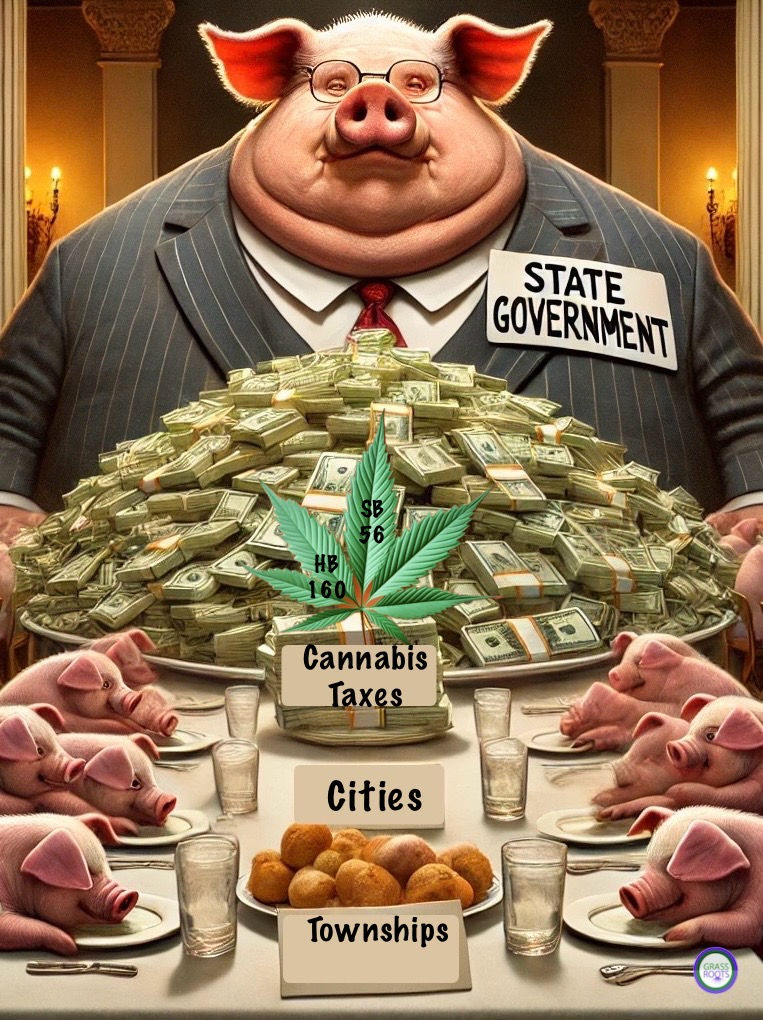Ohio HB 160 Will Take Resources From Local Economies
- Grassroots Ohioans
- Mar 13, 2025
- 3 min read

Ohio lawmakers are working to dismantle Issue 2, which was passed in 2023, and is overwhelmingly supported by voters. Through Senate Bill 56 (SB 56), Senate Bill 86 (SB 86), and House Bill 160 (HB 160), the legislature is attempting to rewrite key provisions of Issue 2, disregarding the will of the people and shifting control back into the hands of politicians who opposed legalization in the first place.
These bills attempt to reallocate tax revenue away from the local communities that agreed to host dispensaries. Issue 2 created a 10% excise tax for adult consumers, on top of the local sales taxes. So far, the state has not released those funds collected since August of 2024 when recreational sales began.
Rather than respect the voter-approved tax structure, SB 56 and HB 160 would redirect funds into the state’s general fund, giving lawmakers control over how cannabis tax revenue is spent. HB 160 proposes maintaining some local funding but reduces the percentages of local monies, and only allocates these funds to the cities for five years. After that, local governments could be cut out entirely!
The social equity provisions in Issue 2, designed to create business opportunities for minorities and those harmed by the War on Drugs, would be gutted. Instead of empowering small business owners and reinvesting in communities, the legislature appears more interested in diverting revenue for general budget priorities that have nothing to do with cannabis policy.
Beyond taxation, these bills introduce harsher penalties for cannabis-related activities. They reverse key aspects of the criminal justice reform that legalization was meant to achieve. SB 56 bans the sharing of homegrown marijuana, even between spouses! HB 160 takes it even further, criminalizing public consumption and punishing repeat offenders with fines, jail time, and even felony charges.
Carrying cannabis as a passenger in a vehicle could result in escalating penalties, including mandatory jail time and license suspensions—far harsher than existing penalties for open alcohol containers in a car. This mandatory jail time will impact county budgets, as sheriffs will be required to jail citizens for a minimum of three days for even the presence of cannabis outside of the trunk of the car.
At the same time, both bills would impose unnecessary restrictions on THC potency, capping flower products at 35% THC and concentrates at 70%. These limits are arbitrary, as other states with legal cannabis markets have not found significant public safety concerns related to potency. Instead, such restrictions could push consumers toward unregulated products that lack quality control and safety testing.
Under Issue 2, Ohioans were granted the ability to grow up to six plants per person, with a maximum of twelve per household. This provision allowed individuals to cultivate their own cannabis for personal use, reducing reliance on commercial sales. SB 56, however, seeks to cut that allowance in half, restricting home cultivation to six plants per household, regardless of the number of adults living there. The change serves no clear public interest beyond limiting personal freedoms and forcing more people to purchase from state-regulated dispensaries.
The hypocrisy of these legislative efforts is hard to ignore. Many of the same lawmakers who claim to be the party of small government, are now pushing more government control, more taxation, and more criminal penalties.
They are not simply refining Issue 2—they are dismantling it piece by piece, disregarding the democratic process and the rights of Ohioans who voted in favor of reform.
Meanwhile, an additional attempt to undermine Issue 2 is being snuck into the state’s budget process. Proposals are circulating that would add a 20% tax on cannabis sales, funneling the revenue back into the general fund. This would be a direct violation of what voters approved, increasing costs for consumers while doing nothing to support local governments or social equity efforts.
The fight to preserve Issue 2 is not just about cannabis—it is about democracy. Ohioans voted for a specific framework, one that prioritized fair taxation, local investment, and personal freedoms. These changes to Issue 2 put Ohio back on a path toward prohibition-era criminalization.
How to take action; Join your fellow Ohioans rallying at the Statehouse Thursday, March 20th for cannabis lobby day! Meet with state representatives and network with our community. We encourage everyone who voted for issue 2 to come. The event is in the rotunda from 10AM to 4PM.
Ohioans who supported legalization must stay engaged, speak out against these rollbacks, and remind lawmakers that their job is to represent the people, not override them!









Comments